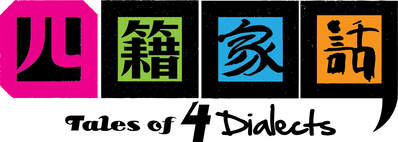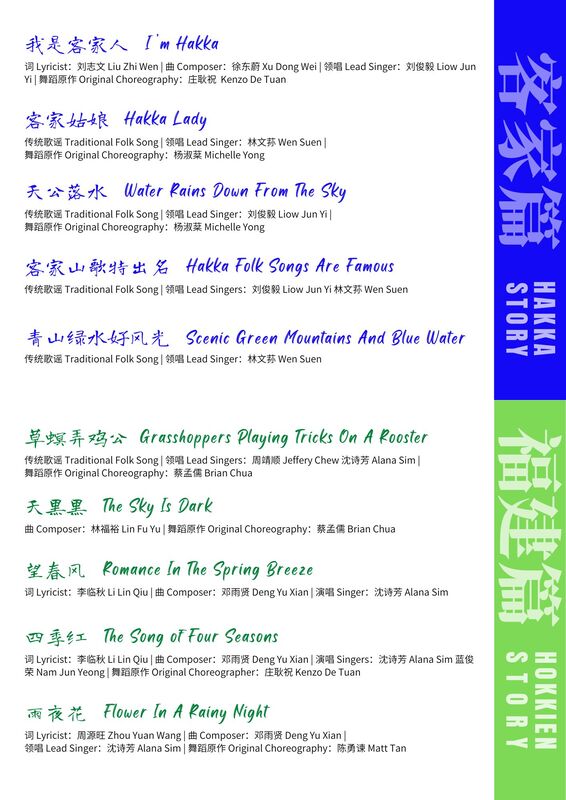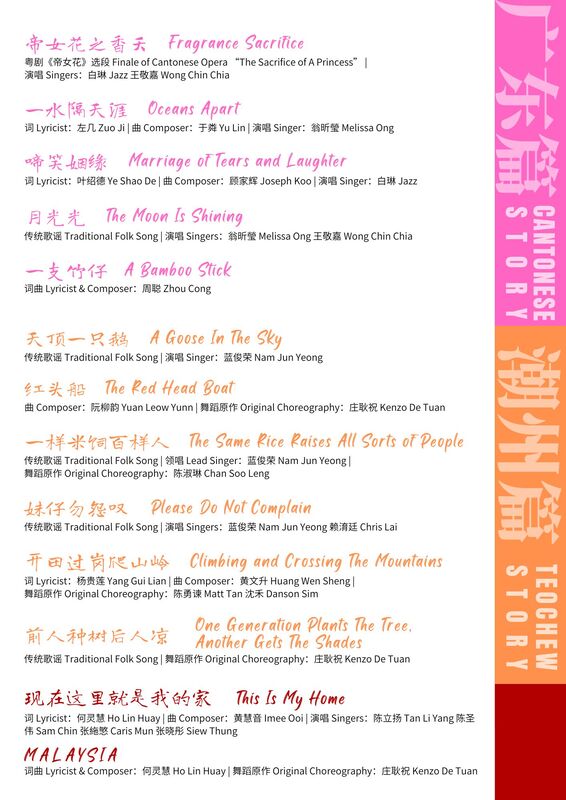《四籍家话》是一个很特别也很有意义的演出:四个方言,四个关于家与情的故事。剧中贯穿熟悉又动听的客家、福建、潮州及广东民谣和经典歌曲,透过表演艺术为歌曲谱上新生命,让大家重新认识方言文化及体会它的重要性。也借此向我们的父母及祖辈致敬。
Tales of 4 Dialects is a unique musical journey through the sounds of our origins, giving new meaning to some of the beautiful Hakka, Teochew and Cantonese folk songs and oldies. It is also a tribute to our parents and grandparents
Tales of 4 Dialects is a unique musical journey through the sounds of our origins, giving new meaning to some of the beautiful Hakka, Teochew and Cantonese folk songs and oldies. It is also a tribute to our parents and grandparents
客家篇 |Hakka
客家人从中国北方迁徙到南方的故事。多年前的南方客家村,勤劳农耕为生,休闲以山歌唱响为乐,年轻的阿生和阿英相爱,但由于阿英自小是大户人家的童养媳,家人安排她远嫁⻢来亚,他们从此分离。
The story of the Hakka people who migrated from the north to the south in China over a thousand years and then established their homes in the South East Asia. The story of Ah Sang and Ah Ying, who have been in love since childhood, but separated by their families who arranged for Ah Ying to be a young bride for a large family in the Melaya
The story of the Hakka people who migrated from the north to the south in China over a thousand years and then established their homes in the South East Asia. The story of Ah Sang and Ah Ying, who have been in love since childhood, but separated by their families who arranged for Ah Ying to be a young bride for a large family in the Melaya
福建篇 |Hokkien
一首首熟悉的闽南歌谣,穿插在福建小村的爱情故事。活泼的村姑 阿花和来自城市的男生阿明一⻅钟情。这对情侣约定再⻅面,但这 段纯真的爱情,在一场意外发生后,竟成了一个终生的遗憾。
A selection of familiar Hokkien folk songs depicting the love story in a small village. A lively village girl, Ah Hui, and a city boy, Ah Ming, fall in love at first sight. The couple make a promise to meet again, but this innocent love becomes a lifelong regret when an accident occurs
A selection of familiar Hokkien folk songs depicting the love story in a small village. A lively village girl, Ah Hui, and a city boy, Ah Ming, fall in love at first sight. The couple make a promise to meet again, but this innocent love becomes a lifelong regret when an accident occurs
廣府篇 |Cantonese
描述在日据时代,一群粤剧团被迫远离家乡 - 广州迁移到⻢来亚一 带。战争的火海却蔓延到南洋,为了应对生存的无奈,剧团竭尽全力,克服困难,团结一致,解决生活中的一切困难。
It depicts a group of Cantonese opera troupe who fled from Guangzhou to Chinatown of Malaya during the world war II era. In response to the helplessness of the war, the troupe did their utmost to overcome the difficulties and unite to solve all the hardships of life.
It depicts a group of Cantonese opera troupe who fled from Guangzhou to Chinatown of Malaya during the world war II era. In response to the helplessness of the war, the troupe did their utmost to overcome the difficulties and unite to solve all the hardships of life.
潮州篇 |Teochew
现今大⻢潮州人的祖辈从岭南来到⻢来亚北部的码头区的故事为谋 生而奋斗,依海为生,努力为他们的后代子孙建立一个安全和稳定 的生活基础。
The story of the Teochew ancestors who came from China to the docklands of northern Malaya and struggled to make a living, working hard to build a secure and stable homeland for their descendants in the years to come
The story of the Teochew ancestors who came from China to the docklands of northern Malaya and struggled to make a living, working hard to build a secure and stable homeland for their descendants in the years to come
导演的话|Director’s Note
“我是客家人, 在家里, 我们兄弟姐妹用客家话交谈, 但下一代都不讲客家话了, 最多也只是听懂一点点。我妈妈常说:“好卖祖公屋,唔好卖祖公话”,当时, 大家听了就算,也没有当一回事。
2014年妈妈去世, 我很后悔妈妈在生时我没把她常常挂在嘴边的一些古老的客家说唱纪录下来..... 如今再也听不到了。再看看我身边的朋友,很多也不说自己的方言了。会不会有那么一天,我们完全 把它们遗忘了? 我突然觉得好像应该做些什么。
《四籍家话》的概念因此诞生。我们希望把四个方言:客家、潮州、福建、广东 的一些动听的民谣及歌曲重新谱上新生命,让它们来说我们的故事。也借此向我 们的父母,我们的祖辈致敬。2015年首演以来,这已是第四次公演,我想如果我的爸爸妈妈还在的话,他们会很欣慰。
I’m from a Hakka family, we the brothers and sisters converse in Hakka but our next generation can only understand very little of our dialect. My mother always said: “it is okay to sell the ancestor’s home but never sell the voice of your ancestors.” We listened but did not pay much attention to it.
My mother passed away in 2014, I regret I didn’t record the sound of her reciting some old Hakka verses when she was alive... and now I will not be able to hear them anymore...
Then I look around, most of the people I know don’t really speak their dialects. I wonder what if one day all these ancient voices are lost forever. Perhaps we should do something about it...
Hence, the birth of the idea and concept for Tales of 4 Dialects – a unique musical journey through the sounds of our origins, giving new meanings to some of the beautiful Hakka, Hokkien, Teochew and Cantonese folk songs . It is also a tribute to our parents and grandparents."
How I wish my parents could be here to witness this, I think they would be very pleased…
2014年妈妈去世, 我很后悔妈妈在生时我没把她常常挂在嘴边的一些古老的客家说唱纪录下来..... 如今再也听不到了。再看看我身边的朋友,很多也不说自己的方言了。会不会有那么一天,我们完全 把它们遗忘了? 我突然觉得好像应该做些什么。
《四籍家话》的概念因此诞生。我们希望把四个方言:客家、潮州、福建、广东 的一些动听的民谣及歌曲重新谱上新生命,让它们来说我们的故事。也借此向我 们的父母,我们的祖辈致敬。2015年首演以来,这已是第四次公演,我想如果我的爸爸妈妈还在的话,他们会很欣慰。
I’m from a Hakka family, we the brothers and sisters converse in Hakka but our next generation can only understand very little of our dialect. My mother always said: “it is okay to sell the ancestor’s home but never sell the voice of your ancestors.” We listened but did not pay much attention to it.
My mother passed away in 2014, I regret I didn’t record the sound of her reciting some old Hakka verses when she was alive... and now I will not be able to hear them anymore...
Then I look around, most of the people I know don’t really speak their dialects. I wonder what if one day all these ancient voices are lost forever. Perhaps we should do something about it...
Hence, the birth of the idea and concept for Tales of 4 Dialects – a unique musical journey through the sounds of our origins, giving new meanings to some of the beautiful Hakka, Hokkien, Teochew and Cantonese folk songs . It is also a tribute to our parents and grandparents."
How I wish my parents could be here to witness this, I think they would be very pleased…



